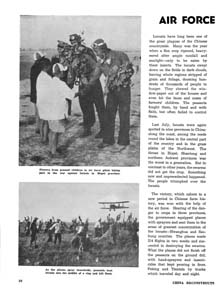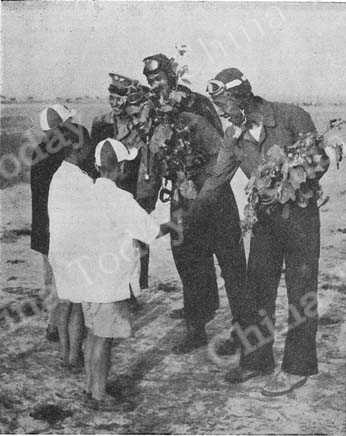
Flowers from peasant children to air force pilots taking part in the war against locusts in Hopei province.
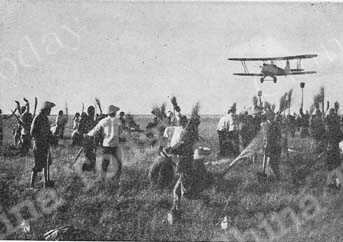
As the planes spray insecticide, peasants beat locusts into the middle of a ring and kill them.
Locusts have long been one of the great plagues of the Chinese countryside. Many was the year when a fine crop ripened, heavy-eared after ample rainfall and sunlight - only to be eaten by these insects. The locusts swept down on the fields in dark clouds, leaving whole regions stripped of grain and foliage, dooming hundreds of thousands of people to hunger. They chewed the window-paper out of the houses and even bit the faces and noses of farmers' children. The peasants fought them, by hand and with flails, but often failed to control them.
Last July, locusts were again spotted in nine provinces in China: along the coast, among the reeds round the lakes in the central part of the country and in the grass plains of the Northwest. The threat in Hopei, Shantung and northern Anhwei provinces "was the worst in a generation. But in contrast to other years, the swarms did not get the crop. Something new and unprecedented happened. The people triumphed over the locusts.
The victory, which ushers in a new period in Chinese farm history, was won with the help of the air force. Hearing of the danger to crops in three provinces, the government equipped planes with sprayers and sent them to the areas of greatest concentration of the locusts - Hwanghua and Ssuhung counties. The planes made 214 flights in two weeks and succeeded in destroying the swarms. What the planes did not finish off the peasants on the ground did, with hand-sprayers and insecticides that kept pouring in from Peking and Tientsin by trucks which traveled day and night.
Some time later, when another locust swarm threatened some 10,000 acres of ripe crops in Tienmen and Hanchwan counties, Hupeh province, the air force set out again. The aid of planes was especially necessary in this area because the locusts were breeding in soggy marshland, difficult to reach by other means.
The appearance of the air force created great excitement among the peasants. They could not stop talking about how a few planes had killed more locusts than 10,000 men could destroy in three days. They made up many sayings about how the People's Air Force fights all aggressors against the Chinese people, be they humans or insects. Toilworn farmers jumped with joy when they saw the planes shuttling over the affected areas. When the planes landed, they ran to the pilots and presented them with delicacies: eggs, salt fish and almonds.
At a welcoming celebration in Hwanghua county, peasant Ni Peng-shan made a speech in which he said: "We used to have four enemies. The People's Government has already wiped out three: bandits, tyrannical landlords and floods. Now Chairman Mao has sent planes to wipe out our last enemy - the locusts."
To the farmers of the affected districts, "Chairman Mao's Anti-Locust Air Force" is added evidence that the government has no interests apart from those of the people.
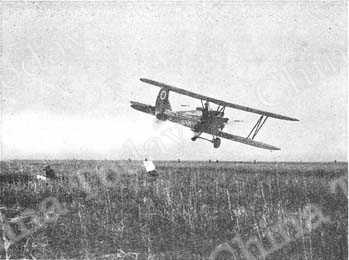
Planes make it possible to clear 150 acres of locusts in a single hour.

The trench method. Locusts which fall into these ditches are killed with "666," the Chinese-made equivalent of DDT.
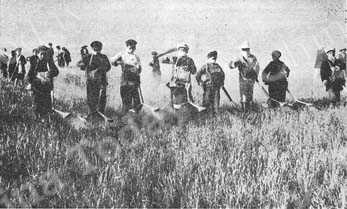
The government issues sprayers and "666" to peasants for use where grass and reeds are too thick for aerial spraying to be effective.


 Copy Reference
Copy Reference 